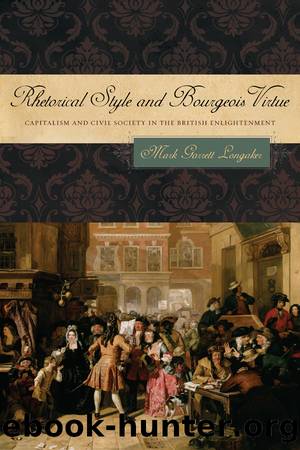Rhetorical Style and Bourgeois Virtue by Mark Garrett Longaker

Author:Mark Garrett Longaker
Language: eng
Format: epub
Publisher: The Pennsylvania State University Press
Private Virtues and Public Benefit
Blair and Smith celebrated the consumer revolution. They believed that rhetorically instilled probity and moderation could save commerce from dishonesty and luxury, and they wanted to protect private institutions from state intervention. Smith placed literary education in civil society because he distrusted government efforts at moral education. Blair imagined two overlapping and institutions within civil society: church and university. Neither regulated by government, both housing free citizens, each instilling the genteel habits of bourgeois association.
Smith advocated privatized higher education because he thought that the stateâs university system had created a leeching class of ineffective and useless scholars. Blair wholeheartedly agreed with Smithâs critique of publicly funded higher education: âThere is so much good Sense and Truth in your [Smithâs] doctrine about Universities, and it is so fit that your doctrine should be preached to the World.â72 This commitment to private higher education is revealed by Blairâs testimony and by his actions. Like Smith, Blair charged two guineas to attend his lectures. (Evidence indicates that Blair often waived the minimum course fee for indigent students.) The Scottish university system, Edinburgh included, followed the civic tradition of shaping a citizenry for public service. The universityâs open admissions policy, its public financing, and the regular governmental intrusion in Edinburghâs curriculum were all possible because of a widespread civic ideology that placed education within the realm of public affairs.73 In an otherwise public institution dedicated to civic virtue, Blair promoted private education for civil society.
In his sermons, Blair voiced similarly liberal inclinations. He praised the government of Great Britain for permitting freedom of religion. People should be allowed to worship as they please âas long as they infringe not the public tranquility nor disturb the stateâ (Sermons 4:177). Government ârestrains the outrages and crimes which would be subversive of society, secures the property, and defends the lives of its subjects.â No mandated public instruction should be allowed, since government must be restricted to âthe actions of men.â Government protects its citizens from âexternal violenceâ that encroaches on liberty (Sermons 2:144). At the beginning of his lectures on rhetoric, Blair connected religious moral edification to private literary education, saying, âThe powers of Taste and Imagination are calculated to give us of the benignity of our Creatorâ (Lectures 25).
Blair told his congregation that religious reflection improves the powers of taste and imagination while tempering commercial excess. After âmuch commerce with the world . . . [one should become] convinced of its vanity. He has seen its most flattering hopes to be fallacious. He has felt its most boasted pleasures to be unsatisfactoryâ (Sermons 1:309). Inward piety benefits the individual soul and the public polity by infusing private virtues that yield public profits: âorder, frugality, and economy.â These âare the necessary supports of every personal virtue . . . the basis on which liberty, independence, and true honour, must ariseâ (Sermons 1:341). Anyone lacking such dispositions âis held in bondage to the world. . . . From the moment you have allowed yourselves
Download
This site does not store any files on its server. We only index and link to content provided by other sites. Please contact the content providers to delete copyright contents if any and email us, we'll remove relevant links or contents immediately.
The Vikings: Conquering England, France, and Ireland by Wernick Robert(84227)
Ali Pasha, Lion of Ioannina by Eugenia Russell & Eugenia Russell(40255)
The Conquerors (The Winning of America Series Book 3) by Eckert Allan W(37473)
The Vikings: Discoverers of a New World by Wernick Robert(36978)
Cecilia; Or, Memoirs of an Heiress — Volume 1 by Fanny Burney(32558)
Cecilia; Or, Memoirs of an Heiress — Volume 2 by Fanny Burney(31956)
Cecilia; Or, Memoirs of an Heiress — Volume 3 by Fanny Burney(31941)
Empire of the Sikhs by Patwant Singh(23084)
The Secret History by Donna Tartt(19085)
Hans Sturm: A Soldier's Odyssey on the Eastern Front by Gordon Williamson(18590)
Cat's cradle by Kurt Vonnegut(15351)
Pimp by Iceberg Slim(14506)
Sapiens: A Brief History of Humankind by Yuval Noah Harari(14389)
Talking to Strangers by Malcolm Gladwell(13370)
Norse Mythology by Gaiman Neil(13363)
Leonardo da Vinci by Walter Isaacson(13336)
4 3 2 1: A Novel by Paul Auster(12391)
Underground: A Human History of the Worlds Beneath Our Feet by Will Hunt(12097)
The Radium Girls by Kate Moore(12028)
